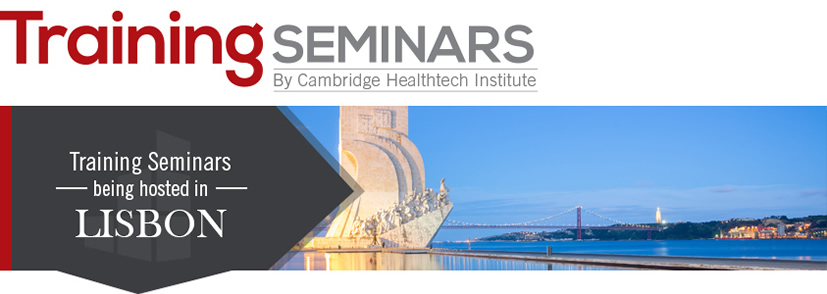
Cambridge Healthtech Institute Training Seminars offer real-life case studies, problems encountered, and solutions applied, along with extensive coverage of the academic theory and background. Each training seminar offers a mix of formal lecture and interactive
discussions and activities to maximize the learning experience. These training seminars are led by experienced instructors who will focus on content applicable to your current research and provide important guidance for those new to their fields.
Monday, 18 November Tuesday, 19 November
Day 1
13:30 – 18:20 Training Seminars in Session
18:20 – 19:30 Welcome Reception
Day 2
8:30 – 18:30 Training Seminars in Session
12:45 Lunch Provided
Refreshment breaks and exhibit hall viewing hours also provided.
TS6A: Antibody Deep Sequencing and Single Cell Analysis - Detailed Agenda
Instructors:
Brandon DeKosky, PhD, Assistant Professor, Department of Chemical Engineering, Department of Pharmaceutical Chemistry, Kansas Vaccine Institute, The University of Kansas
Matías Gutiérrez González, PhD, Postdoctoral Researcher, Pharmaceutical Chemistry, The University of Kansas
In this training seminar, participants will learn about recently developed methods for Next-Generation Sequencing (NGS) and single-cell analysis of antibody repertoires. Part 1 will provide an introduction to antibody repertoires, including genetic
background, generation of diversity, and sequencing technologies. Part 2 will incorporate an introduction and hands-on session on computational tools for analyzing antibody repertoire NGS data. We will focus on pre-processing, analysis, and visualization
of data, along with presentation of existing bioinformatics pipelines available. Part 3 will focus on an overview of the development of newer methods in single-cell analysis of antibody immune responses. The course will be interactive with case
studies, and participants will be able to download data and examples. Please bring your computer.
TS7A: Intro to Bispecifics: History, Engineering, and Applications - Detailed Agenda
Instructors:
Regis Cebe, MSc, Scientific Technical Leader, Novartis Biologic Center, NIBR, Novartis Pharma AG, Switzerland
Rakesh Dixit, PhD, DABT, President & CEO, Bionavigen
Intro to Bispecifics will be organized as an informative and practical guide to get up to speed on critical aspects of bispecific antibody therapeutics. Topics will include historical successes, failures, and lessons learned. Specific practical instruction
will span mechanisms of action, engineering, developability, regulatory considerations, and translational guidelines. Perspectives on ideal implementation of bispecifics as targeted and immunomodulatory approaches will be discussed.
Wednesday, 20 November and Thursday, 21 November
Day 1
8:30 – 17:45 Training Seminars in Session
12:45 Lunch Provided
17:45 – 18:45 Networking Reception
18:45 – 19:45 Problem Solving Breakout Discussions
Day 2
8:30 – 12:45 Training Seminars in Session
Refreshment breaks and exhibit hall viewing hours also provided.
TS6B: Genome Editing with CRISPR: Toward Novel Research, Translational and Clinical Applications - Detailed Agenda
Instructor:
Serguei V. Kozlov, PhD, MBA, PMP, Principal Scientist/PM, Team Leader PTO, Center for Advanced Preclinical Research, Frederick National Laboratory for Cancer Research (NCI)
This rigorous day-and-a-half program compiled for specialists interested in applying genome editing technologies for both basic and translational research will comprehensively review the state-of-the-art information on gene editing strategies and
applications in various areas, such as disease modelling, drug discovery, and development. Beginning from introductory level basic technology aspects, key molecular features, strengths, and shortcomings of CRISPR/Cas9 systems, the instructor will
advance towards sharing in-depth knowledge related to virtually all facets of present-day genome editing applications, such as constructing of cell culture-based experimental platforms, engineering disease models for in vivo research supporting preclinical drug development workflows, rational design and functional screening of sgRNA libraries, application of CRISPR/Cas9 technology for diagnostic and therapeutic purposes, and many others.
TS7B: Rational Approaches to Biologics Formulation and Delivery - Detailed Agenda
Instructor:
Christina Vessely, PhD, Senior Consultant, CMC, Analytical and Formulation Development, Biologics Consulting
This course is intended to give participants an understanding of the basic principles of biologics formulation development, with an emphasis on maintaining long-term product stability. Participants should expect to come away with a better understanding
of biochemical and biophysical properties of proteins and peptides, and how excipients and other strategies can be used to mitigate degradation. Formulation development discussions will cover both liquid and lyophilized dosage forms. The focus
of the session will be on maximizing efficiency during formulation development, with an eye on regulatory compliance throughout the product development lifecycle. As such, following the introduction to formulation development, we will cover more
complex formulation development topics, including strategies for the formulation of low solubility APIs, advice for the selection of container/closure systems and drug delivery devices, as well as the studies that must be performed to demonstrate
the compatibility of those materials with the product.
Training Seminar Information
Each CHI Training Seminar offers 1.5 days of instruction with start and stop times for each day shown above and on the Event-at-a-Glance published in the onsite Program & Event Guide. Training Seminars will include morning and afternoon refreshment
breaks, as applicable, and lunch will be provided to all registered attendees on the full day of the class.
Each person registered specifically for the Training Seminar will be provided with a hard copy handbook for the seminar in which they are registered. A limited number of additional handbooks will be available for other delegates who wish to attend
the seminar, but after these have been distributed, no additional books will be available.
Though CHI encourages track hopping between conference programs, we ask that Training Seminars not be disturbed once they have begun. In the interest of maintaining the highest quality learning environment for Training Seminar attendees, and because
seminars are conducted differently than conference programming, we ask that attendees commit to attending the entire program, and not engage in track hopping, as to not disturb the hands-on style instruction being offered to the other participants.